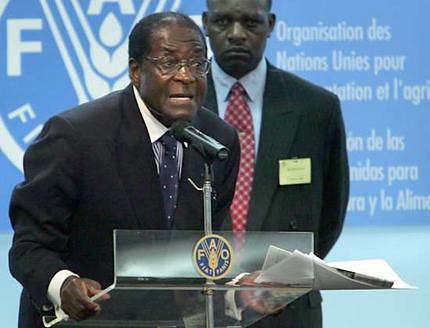
President Robert Mugabe of Zimbabwe speaking at the 60th anniversary conference of the United Nations Food Programme., a photo by Pan-African News Wire File Photos on Flickr.
President arrives in Brazil
Tuesday, 19 June 2012 12:00
Francis Nhema
Morris Mkwate in Rio de Janeiro, Brazil
President Mugabe arrived here yesterday to attend the United Nations Conference on Sustainable Development (Rio+20), which begins tomorrow.
Vice President John Landa Nkomo is the Acting President.
President Mugabe was received at the Galeao International Airport by Zimbabwe’s chief diplomat to Brazil, Ambassador Thomas Bvuma, and top Brazilian government representatives.
Accompanying him are First Lady Amai Grace Mugabe, Ministers Simbarashe Mumbengegwi (Foreign Affairs) and Francis Nhema (Environmental and Natural
Resources Management) and senior Government officials.
The three-day conference marks the 20th anniversary of the UN Conference on Environment and Development held here in 1992 and also coincides with the 10th anniversary of the 2002 World Summit on Sustainable Development held in Johannesburg, South Africa.
It will run under a two-pronged theme: “A Green Economy in the Context of Sustainable Development (Poverty Eradication) and the Institutional Framework for Sustainable Development.”
The “green economy” concept primarily focuses on creating environmentally-friendly economies that conserve natural resources while sustainable development entails balancing human requirements and environmental protection.
Key discussion areas that include energy, water, food security, jobs, cities, oceans and disasters have already been drawn up.
Regarding energy, delegates will examine the need to promote energy sources that minimise pollution of the environment.
They will also consider methods of improving access to safe water and ensuring food production and consumption do not negatively affect the environment.
An action plan as well as employment creation policies will come under the spotlight.
Delegates are expected to deliberate on commitments made at the 1992 conference.
Uppermost are analyses of comprehensive efforts that have been made to deal with climate change and biodiversity.
Robust debate is likely to emerge during discussions around the implementation of the Kyoto Protocol — an international agreement with targets for industrialised countries to reduce greenhouse gas emissions.
Developing nations contend the developed world remains indifferent towards the protocol.
Last year, the African Union approved the Africa Consensus Statement to Rio+20, which pushes for developed countries to commit to a second period under the protocol.
The commitment would run from next year to 2017 in terms of the statement that is expected to guide the African perspective here.
Africa is also targeting massive cuts in greenhouse gas emissions by 40 percent below 1990 levels within the next four years.
The continent is, in addition, seeking to ensure industrialised countries provide long-term financing, technology and capacity-building support to enable developing nations to effectively address challenges stemming from climate change.
Cde Nhema said in an interview that it was time the world seriously considered the effects of climate change.
He said developed countries should be committed to reducing carbon emissions.
“The conference brings together developed and developing countries to find a compromise on environmental issues,” said Cde Nhema.
“We believe these emissions (mainly from industrialised countries) are continuing unabated.
“So, we remind them to abide by agreements.
“Furthermore, we want to remind developed countries to fund developing countries and that technology transfer should be free.
“Historically, it has been their obligation because they are largely responsible for carbon emissions . . . we also remind the world to treat climate change with the urgency it deserves.”
No comments:
Post a Comment